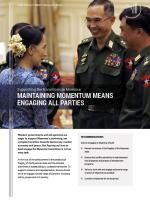DIIS Policy Brief
High hopes for Myanmar but inclusive political settlement is needed
Rushing development can be bad for peace
After decades of international isolation, Myanmar is seeing a rapid influx of Western government and aid agencies eager to support the country’s promising, yet complex transition towards democracy, market economy and peace.
It is pivotal to support the newly elected, civilian, government’s effort to reduce further the role of the military and establish lasting peace among the different ethnic and religious groups in the country. Yet figuring out how to best engage the Myanmar transitions is far from an easy task. At the root of donors’ predicament is the paradoxical fragility of the Myanmar state and the inherent dilemmas of trying to build states to build peace in contested territories.
In this policy brief, senior researcher Louise Riis Andersen suggests that donors engage a broad range of partners, including representatives of ethnic groups and civil society. Keeping in mind that the central goverment holds only a limited presence in many parts of the country, there is a clear risk that overly state-centric approaches to development will prove counter-productive to the long-term objective of building an inclusive, representative and accountable state in Myanmar. What is needed at the present juncture is to find ways of bridging existing non-state systems of authority and service provision to formal state structures. Finding ways of doing that is the responsibility of the parties to the conflict, including the government, the military and the ethnic armed organisations. Donors, however, are responsible for ensuring that they do not – via their programming modalities – prevent or halt the emergence of such hybrid, interim arrangements.Topics
Regions
Myanmar

Maintaining momentum means engaging all parties
Supporting the transitions in Myanmar

